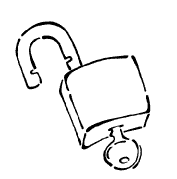|
Vol. 8, No. 3 Summer 2000 |
Subscribe to AT Messenger Download PDF Viewer |
Aspire to Independence
by Jody Tate
As I sit down to write this article, I have mixed emotions. Generally I feel that I am a pretty positive person, but lately, I find that it's been hard to maintain a "happy face." The support that I feel from friends has been my "lifesaver." Many of my friends are people who work directly in the health care arena, and there seems to be a similar understanding and common way of acting around a person who may have physical challenges. The "helping" and caring notions are there, but so is the desire to let the person be as independent as possible. This may mean letting the person discover where his/her strengths and needs are when completing a task.
Before I go any further, I should give you a little of my background.
I had two strokes at the age of 33. I am now 35 years old and have to rely
on certain technology to be available, the environment to be accessible,
and/or help from others to help meet some of my basic needs (for instance,
driving). Prior to my strokes, I was basically independent. Suddenly I had
to deal with not only the strokes but also being very dependent on others.
As I continue with my rehabilitation (becoming stronger, more coordinated,
more organized in my thoughts and motor patterns), I have a very strong
desire to use these skills functionally. I want to use the skills that I
have  relearned and the skills that I have adapted
to meet my needs. I think society holds the "key" to unlock the
doors for individuals with disabilities to show their potential for being
independent, active, beneficial members of our society. At times society
limits an individual's independence by allowing access obstacles to remain
(such as architectural barriers and lack of assistive technology). These
obstacles may have been placed there deliberately, out of ignorance and/or
financial limitations.
relearned and the skills that I have adapted
to meet my needs. I think society holds the "key" to unlock the
doors for individuals with disabilities to show their potential for being
independent, active, beneficial members of our society. At times society
limits an individual's independence by allowing access obstacles to remain
(such as architectural barriers and lack of assistive technology). These
obstacles may have been placed there deliberately, out of ignorance and/or
financial limitations.
If I encounter an obstacle that doesn't make sense with regard to enhancing independence, I ask who I should contact and then follow up with a phone call and/or a letter. I have to say, when I encounter a good experience and/or policy, I have called to give people positive comments too. It is just as important to comment about positive as well as negative things. I do not feel that these comments will change the world; however, I do feel it is essential for the appropriate person to hear how an obstacle or removal of a certain obstacle may enhance or decrease a person's independence. I encourage you to somehow notify the appropriate person about your feelings, positive and/or negative, as you experience different situations in society. Let that person know how your independence is affected. You never know; you may make the difference!

